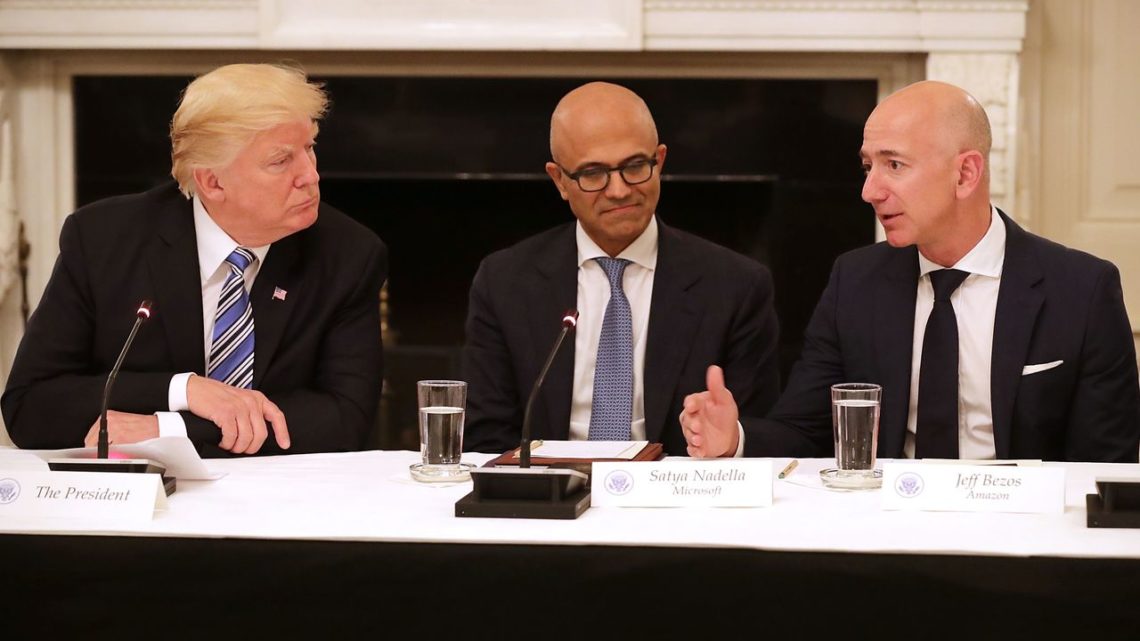The once frosty relationship between Donald Trump and Jeff Bezos has been warming up lately, due in large part to the Amazon founder’s apparent newfound willingness to lick the president’s boots and the president’s longstanding affection for bootlickers.
But Tuesday offered a brief window into their old feud after Punchbowl News reported that Amazon planned to display the cost of tariffs next to product prices on its website. White House press secretary Karoline Leavitt said she’d talked to the president about the report and called the move “hostile and political.” She accused Amazon of partnering with a “Chinese propaganda arm,” referencing a 2021 Reuters report about Amazon removing reviews on President Xi Jinping‘s speeches and writing.
The two billionaires appear to have quickly hashed it out over a phone call after a reportedly “pissed” Trump called Bezos. And Amazon released a statement saying it had only ever considered the tariff feature—which it didn’t go forward with—for its low-cost store.
After the ordeal, Trump had only good things to say about Bezos. “He was terrific,” Trump told reporters. “He solved a problem very quickly, and he did the right thing, and he’s a good guy.”
The brief lover’s quarrel was a bit of déjà vu from Trump’s first term in office. But the speedy resolution is an indicator of just how much has changed since then. Here’s a look back at how the relationship between Trump and Bezos has turned from sour to sweet.
#SendDonaldtoSpace
The spat between Trump and Bezos dates back to at least 2015, when Trump was still running for the Republican presidential nomination, and tweets were still 140 characters. It was around that time that Trump began trolling Bezos, accusing him of using the Washington Post as a “tax shelter” for Amazon. “The @washingtonpost loses money (a deduction) and gives owner @JeffBezos power to screw public on low taxation of @Amazon!” Trump wrote, likely in retaliation for the Post’s critical coverage of his campaign.
Bezos, who was still willing to stand up for that coverage, quickly clapped back: “Finally trashed by @realDonaldTrump. Will still reserve him a seat on the Blue Origin rocket. #sendDonaldtospace,” Bezos wrote, along with a link to a video of his space company’s recent rocket landing.
“We Can’t Let Him Get Away with it.”
The Trump-Bezos dynamic was hardly any chummier once Trump clinched the nomination, and began calling for antitrust scrutiny into Bezos’s businesses. In an interview with Sean Hannity in May 2016, Trump accused Bezos of “getting away with murder tax-wise.” He argued Bezos was using the Post “as a tool for political power against me and against other people” and said, “We can’t let him get away with it.”
The Post’s then executive editor, Martin Baron, stood up for the paper’s editorial independence from Bezos, saying at the time that he had “received no instructions from Jeff Bezos regarding our coverage of the presidential campaign—or, for that matter, any other subject.”
Bezos backed that sentiment in his own interview with Baron, also in May 2016, saying that Trump’s ranting against the Post was “not an appropriate way for a presidential candidate to behave.” “We want a society where any of us, any individual or institution, if they choose to, can scrutinize, examine and criticize an elected official, especially a candidate for the highest office in the most powerful country on Earth. It’s critical,” he said. “What would be shocking and disturbing is if you weren’t doing that.” Shocking and disturbing, indeed!
The Battle of the Postal Service
Bezos extended an olive branch to Trump after the 2016 election, saying he would give the new president his “most open mind.” But Trump wasn’t interested in making nice and continued to hammer on about Amazon’s alleged tax evasion on Twitter. Those attacks escalated when Trump began laying pressure on the US Postal Service to raise shipping rates on Amazon, causing its stock price to slide.
Once the pandemic hit, Trump threatened to withhold desperately needed funding from the Postal Service, unless it hiked prices on Amazon. “Every time they bring a package, they lose money on it,” Trump said at the time, arguing the Postal Service should “raise the price of a package by approximately four times.”
The Empire Strikes Bezos
Arguably the biggest battle between Trump and Bezos was over a $10 billion Pentagon contract codenamed JEDI, which the Trump administration awarded to Microsoft in 2019. Shortly after, Amazon sued the administration over the snub, arguing that the president’s “personal vendetta” against Bezos had cost Amazon Web Services the contract. The lawsuit referenced reporting from a book on Defense Secretary Jim Mattis in which Trump allegedly told Mattis to “screw Amazon” out of the JEDI deal.
In a blog post about the case, Amazon lashed out at Trump’s “blatant cronyism.”
“The President has removed perceived political threats from their roles simply for doing their jobs,” the post read. “A similar pattern has emerged within the [Department of Defense] as senior military leadership cannot exercise their sound judgment without facing retribution, “The President has become emboldened of late in flaunting his role influencing government contracts for politically motivated reasons.”
After the Pentagon cancelled the contract altogether, the courts dismissed the lawsuit as moot.
The Post-Presidency Thaw
Apart from the fight over the JEDI contract, Trump and Bezos’s squabbles quieted to a simmer during the Biden years, likely because Trump himself was banned from the social platforms where he did most of his Bezos-bashing. This period also aligned with Bezos’s own personal transformation, including his decision to step down as CEO of Amazon in 2021, though he remains the company’s executive chair.
The Biden Administration hardly had a friendly relationship with Amazon. President Joe Biden appointed famed Amazon critic Lina Khan to chair the Federal Trade Commission, which proceeded to file a lawsuit against the e-commerce giant (and pretty much every other tech giant), accusing it of “illegally maintaining monopoly power.” That suit remains ongoing. It’s unclear how much the Biden administration’s crackdown on tech monopolies played into Bezos’s sudden political shift, but by the time the 2024 election rolled around, he was already courting Trump’s affections.
The day of Trump’s attempted assassination in Butler, Pennsylvania, Bezos tweeted that Trump had “showed tremendous grace and courage under literal fire,” and according to Axios, the two men had a phone call shortly after that formed the basis of their bromance.
An “Extraordinary Political Comeback”
As the 2024 election neared, Bezos’s once hands-off-approach to the Post’s journalism unraveled when he spiked the paper’s endorsement of Kamala Harris. It was the first time the Post had declined to endorse a candidate since the 1980s. In an op-ed explaining the decision, Bezos wrote that endorsements create “a perception of bias. A perception of non-independence.” The decision reportedly cost the Post hundreds of thousands of subscribers.
Of course, Bezos didn’t seem quite so concerned about the “perception of bias” when, after the election, he and Sanchez dined with Trump and Elon Musk at Mar-a-Lago, or when Amazon donated $1 million to Trump’s inaugural fund, or when he stood behind Trump on the dais as he took the oath of office in January.
“Personal Liberties and Free Markets”
By February of this year, Bezos’s political realignment was clear—and if it hadn’t been, he certainly made it so when he published a memo on the new direction of the Post’s op-ed page. “We are going to be writing every day in support and defense of two pillars: personal liberties and free markets,” he wrote in a message he shared on X. “We’ll cover other topics too of course, but viewpoints opposing those pillars will be left to be published by others.”
The Post has since seen an exodus of top talent, including the editor of the opinion section, David Shipley. Bezos wrote that he had offered Shipley “the opportunity to lead this new chapter,” but that “if the answer wasn’t ‘hell yes,’ then it had to be ‘no.’”
Apart from the minor tiff about tariffs, the formerly rocky relationship between Trump and Bezos has been smooth over the course of Trump’s first 100 days in office. So smooth, that Blue Origin reportedly just landed a $2.3 billion NASA contract.
So much for #sendDonaldtospace. The president is doing just fine by Bezos here on Earth.
Disclosure: Writer Issie Lapowsky is married to an Amazon employee.
More Great Stories From Vanity Fair
-
How Miriam Adelson Went From Big MAGA Winner to Casino Loser in Trump’s First 100 Days
-
The Truth Underlying Pete Hegseth’s Job Security
-
“It’s About Him”: How Trump Is Perverting the Presidential Photo Stream
-
Inside the Case of Kim Kardashian’s Paris Robbery
-
How Sebastian Stan Became Hollywood’s Most Daring Shape-Shifter
-
The Ballad of Bill Belichick and Jordon Hudson
-
Juilliard Is Going Tuition-Free
-
Elon Musk’s Breeding Spree Is So Much Wilder Than You Thought
-
Every Quentin Tarantino Movie, Ranked
-
Meet Elon Musk’s 14 Children and Their Mothers (Whom We Know of)
-
From the Archive: Sinatra and the Mob
The post Everything We Know So Far About Jeff Bezos’s Relationship With Donald Trump appeared first on Vanity Fair.




